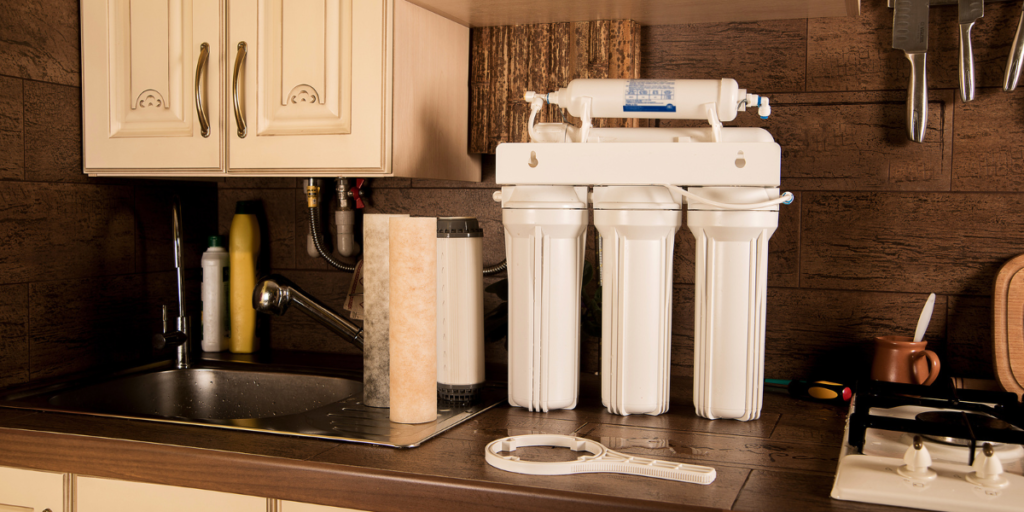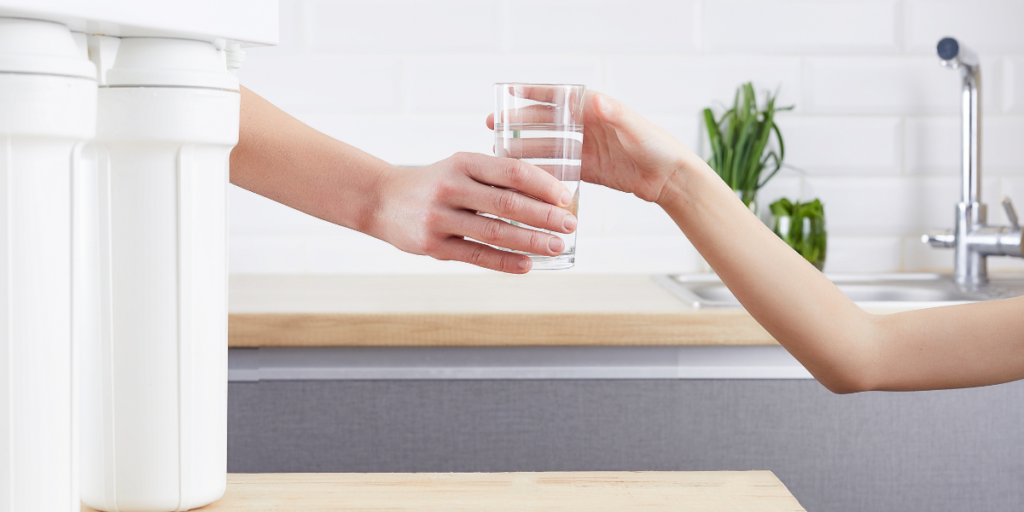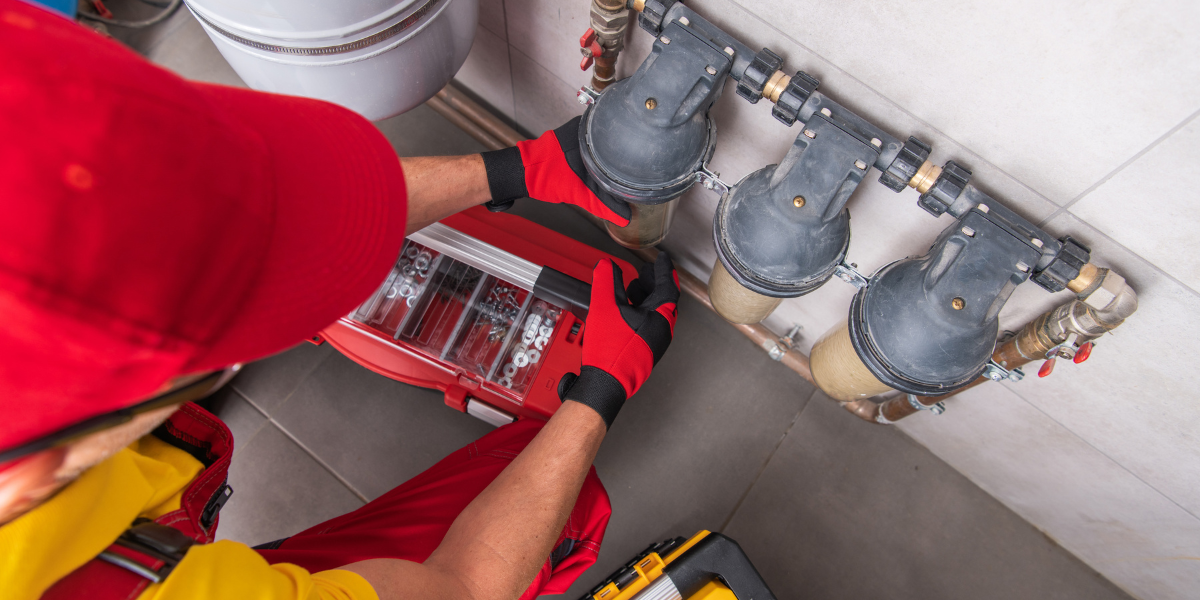Choosing the Right Location for Your Whole House Water Filtration System
Are you tired of dealing with hard water, unpleasant odors, or off-tasting tap water?
The solution is as crystal clear as the water you desire – a whole house water filter. However, the question that leaves most homeowners scratching their heads is – ‘Where should a whole house water filter be installed?’ Dive into this enlightening article as we demystify the best locations for your water filter installation, ensuring you enjoy clean, safe, and tasty water throughout your home. Don’t let the installation process dampen your spirits, we’ve got you covered!
What is a whole house water filter filtration system?
A home water filter, also known as a whole house water filtration system, is a filtration system that is installed at the main water line of a house. It is responsible for filtering all the water entering the house, ensuring that every tap and appliance receives clean water.
How does a whole house water filter work?
A whole-house water filter uses various filtration media and technologies to remove impurities. The water flows through the filter system, passing through different layers of filtration media, such as carbon filters and sediment filters. These filters trap and remove contaminants, leaving you with cleaner and safer water.
What are the benefits of a whole-house water filter?
There are several benefits of installing a whole-home water filter in your home. Firstly, it improves the overall water quality by removing impurities and contaminants. This means you can enjoy cleaner and safer drinking, cooking, and bathing water.
Secondly, a whole home water filter protects your appliances from the harmful effects of sediment and other contaminants. It can extend the lifespan of your water heater, washing machine, dishwasher, and other water devices.
Lastly, a home water filter is cost-effective in the long run. While the initial installation may seem like an investment, it can save you money on buying bottled water and reduce the need for frequent repairs or replacements of your appliances.

How to choose the right whole-house water filter?
When choosing a whole-house water filter, several factors should be considered. Firstly, you need to determine the type of water supply you have. Whether you have municipal or healthy water, the type of contaminants present can vary.
Secondly, identify the contaminants you want the whole house water filter to remove. Different filters are designed to target other contaminants, so choosing one that meets your needs is essential.
Lastly, the size of the filter is also essential. It should be able to handle the flow rate of your water supply to ensure effective filtration.
Follow these steps to make sure your whole house water filter:
- Is the right size
- Removes the right contaminants
- Suits your budget
- Is reliable and trusted by customers
- Has third-party proof of performance
https://waterfilterguru.com/how-to-choose-a-whole-house-water-filtration-system/
Can the whole house water filter remove all contaminants?
While a whole-house water filter can remove a wide range of contaminants, it may not be able to remove all types. Some pollutants, such as viruses and certain chemicals, may require specialized treatment. It’s essential to check the specifications of the filter and consult with a water filtration expert to ensure that your chosen filter can effectively remove the specific contaminants present in your water.
Where should a whole-house water filter and water softener be installed?
A whole-house water filter should be installed at the main water line of your home. They’re often paired with water softeners in areas with “hard water” that has high levels of calcium and magnesium. This is where the water enters your home, and installing the filter at this point ensures that all the water that flows into your house passes through the filtration system.
Can I install the whole house water filter myself?
Installing a whole house water filter can be complex, especially if you need to become more experienced with plumbing work. Hiring a professional plumber or a water filtration specialist is recommended to ensure that the filter is installed correctly and functions properly.
Should the whole house water filter be installed before or after the softener?
The ideal placement of the whole house water filter depends on whether you have a water softener. If you have a water softener, installing the whole house water filter after the water softener is generally recommended. This allows the water softener to remove the hard minerals before the water passes through the filtration system. However, it’s best to consult a water treatment professional to determine the optimal water filter installation depending on your specific needs.
How does the installation process of a whole house water filter work?
A city water filter installation typically involves:
- Shutting off the main water supply.
- Cutting the water line.
- Connecting the filter system to the water line.
It may also involve additional steps, such as installing a bypass valve and connecting the filter system to the electrical system. Following the manufacturer’s instructions or seeking professional assistance is essential to ensure a proper installation.

What are the benefits of installing a whole-house filter?
Installing a whole-house water filter can benefit your home and your family. Firstly, it can significantly improve the taste and odor of tap water. By removing impurities and contaminants, the filtered water tastes fresher and cleaner.
Secondly, a whole-house water filter protects your appliances from the damaging effects of sediment and other contaminants. It can prevent clogging and corrosion, saving money on costly repairs or replacements.
Lastly, a whole-house water filter is cost-effective in the long run. It eliminates the need for buying bottled water, reduces the frequency of filter replacements, and can prolong the lifespan of your appliances, resulting in cost savings over time.
Even if your water is free of impurities, mineral deposits can harm your plumbing and appliances and result in dry, itchy skin. To guarantee that your home has pure water for all your requirements, installing a whole-house water filtration system offers a secure, easy, and cost-effective alternative. Below, we’ve outlined the four main advantages of installing a whole water filtration system.
https://dropconnect.com/what-is-a-whole-house-water-filter/
How often should a whole house water filter be replaced?
The frequency of replacing a whole-house water filter depends on the type of filter and the quality of your water. Generally, replacing the filter every 6 to 12 months is recommended. However, it’s essential to regularly test your water and monitor the filter’s performance to determine the optimal replacement schedule. Your new filter will come with manufacturers’ instructions and best practices for you to review.
What signs indicate that the whole house water filter needs to be replaced?
Several signs indicate that a whole house water filter needs to be replaced. If you notice a decrease in water pressure, a change in water taste or odor, or an increase in sediment or impurities in the filtered water, it may be time to replace the filter. Additionally, if the filter is visibly dirty or past its recommended replacement date, it should be replaced.
Are there any maintenance requirements for a whole-house water filter?
Maintaining a whole house water filter is relatively simple. Regularly checking the filter system for any signs of damage or leaks, replacing the filter as recommended, and cleaning any sediment or debris that may accumulate in the filter housing are essential maintenance tasks. It’s also crucial to follow the manufacturer’s instructions and recommendations for proper maintenance.
Further Reading & Entities
https://en.wikipedia.org/wiki/Water_filter
https://en.wikipedia.org/wiki/Water_purification
https://www.cdc.gov/healthywater/drinking/home-water-treatment/water-filters.html
Q: Where should a whole house water filter be installed?
A: A whole house water filter should be installed at your home’s main water supply point, where the water enters your plumbing system.
Q: How do I install a whole house water filtration system?
A: To install a whole house water filtration system, you must locate your home’s main water shut-off valve. Then, you can cut the water supply, install the system upstream of your water heater, and reconnect the water supply.
Q: Do I need to install a whole house water filter?
A: Installing a whole-house water filter is not mandatory but highly recommended. It can help improve the quality of the water in your home by removing harmful contaminants and providing cleaner and healthier water for you and your family.
Q: How can I test my water system?
A: You can test your water by using a water testing kit. These kits are readily available online or at hardware stores. Follow the instructions provided with the equipment to collect a sample of your water and test it for various contaminants.
Q: What is a water treatment system?
A: A water treatment system is designed to remove impurities and contaminants from water, making it safe for consumption. This system can include various filtration methods, such as activated carbon filters, reverse osmosis, or UV disinfection.
Q: Can I install a whole house water filter myself?
A: You can install a water filter yourself if you have basic plumbing skills. However, if you are unsure or uncomfortable with the installation process, it is recommended to hire a professional plumber to ensure proper installation and avoid any potential issues.
Q: How do I install the water filter?
A: To install the water filter, you must locate a suitable place to put the filter in your plumbing system. This is typically done after the main water shut-off valve. You will then need to connect the filter to your main water supply line and any necessary bypass valves.
Q: Should I install a whole-house water softener?
A: Installing a whole-house water softener is a personal choice and depends on your specific water quality. A water softener can help remove minerals that cause hardness in water, resulting in softer water throughout your home.
Q: How do I install a whole home water filter?
A: Installing a whole-home water filter is similar to installing a whole-house one. You must locate the main water shut-off valve, cut the water supply, and install the filter in the main water line. It is recommended to follow the manufacturer’s instructions for specific installation guidelines.
Q: Where should I install the system for a municipal water supply?
A: The whole house water filter system should be installed where the water enters your home for a municipal water supply. This is usually near the water meter or where the main water line enters your property.

